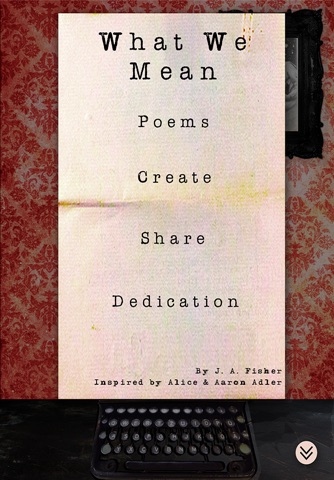
What We Mean is a poetry chapbook and creative application. Composed using love letters written between his grandmother and grandfather during World War 2, J. A. Fisher presents 20 blackout poems. In an effort to simulate a poetic War Department Censurer, Mr. Fisher redacted sections of his grandfather’s letters into poetry. Using the versatility of the digital medium, he weaves a poetic narrative between the original content of the letters and the created poems. Readers can swipe between both copies at will; choosing to either read the intact letters, poems, or the narrative that takes place between the two. Enjoy this final unspoken conversation between grandson and grandfather and then create your own masterpiece. Compose works of art, jokes, and meaning using your device’s camera in concert with the instruments of What We Mean.
Honorable Mention at Corona Labs:
What We Mean
What We Mean shares a captivating collection of poetry based on love letters between the developer’s (J. A. Fisher’s) grandparents during World War II. As a poetry lover and history buff, I absolutely loved the compilation of beautiful poems inspired by the original content from the letters. J. A. Fisher also shares 20 blackout poems – by redacting sections of his grandfather’s letters, he simulates a poetic War Department Censurer. What We Mean offers a unique, one-of-a-kind experience that you can enjoy from the App Store.
Review at Thoughts at Intervals
Reading the other poems, it’s interesting to note that some of them are merely a concentrated form of the original letter, as though any impure words have been removed by distillation, preserving the meaning of the base text, yet expressing it more elegantly. Switching between the redacted letter and the original text brings home the potential power of this process of elimination.
Yet other poems transform the meaning entirely, to construct whole new narratives, using the constraint provided by a fixed palette of words to inspire the creative process. I suppose that this is at once both easier and more difficult than writing poetry with the dictionary as your source material.
The Guardian
This thought-provoking poetry app is the work of Joshua Adler Fisher, who has taken love letters written between his grandparents during World War II, then redacted sections of them into poetry that you can read, or play with.
Doublemesh
What We Mean is a poetry chapbook and creative application. Composed using love letters written between his grandmother and grandfather during World War 2, J. A. Fisher presents 20 blackout poems. iPhone and iPad
Reviewster
Listed as one of the best new apps of 2013.
Joshua Adler Fisher presents an unusual poetry app based on love letters written between his grandparents during the Second World War. Excerpts from the letters are there for users to read and play with.



